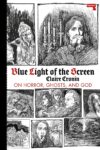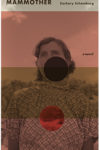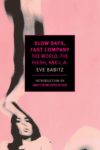Fiction

Catie Disabato writes a monthly column for Full Stop about the contemporary and sometimes not-so-contemporary literature she’s been reading. Her first novel is forthcoming from Melville House in Spring 2015.
Crystal Eaters – Shane Jones
Beyond the Pale Motel – Francesca Lia Block
Poetry
Therese – Claire Cronin
Titanic – Cecilia Corrigan
Full Disclosure: Both of the poets I read this month are my dear friends. As a writer, you often read your friends’ work, and I doubt this will be the last time this comes up. While I’m obviously biased, this isn’t a column of reviews, it’s a column of feelings and thoughts I had while reading and despite my kinship with these poets, I still thought and felt things while reading their work. One of the things I thought was “my friends are the objective best,” a thought I will expand on below.
Full Disclosure 2: I think I spoiled the end of Beyond the Pale Motel, kinda. Spoiler alert.
I’ve had the distinct pleasure of being a fan of Claire Cronin’s work ever since she was a Goth Teenager who matriculated at the Iowa Young Writer’s Program for two weeks during the summer of 2005. She was a poet and a songwriter even then, and she retains her Goth spirit — although I haven’t seen the black lace parasol around for a while. Growing up with an artist’s work is a rare pleasure and I’m lucky I got to do so with someone as talented as Claire. A tip for any teens who might be reading this: find an artist your own age to grow up with. Stay with them as long as they keep creating even if you go through a stage where you don’t like their work (I’m happy to report I never had that experience with Claire). This practice is like making lines on the wall to track your height, but for your emotional development.
Claire’s chapbook Therese is a single fantastic poem in 15 sections, based on the life of Saint Therese of Lisieux. I love thinking about Claire’s creative process for this poem, which she discussed in an interview with her publisher H_NGM_N: “I spent months taking notes on Therese’s life from a big, lovely, strangely-translated biography that my grandmother gave me years ago… I had to be careful not to read the book too linearly, or do any research online, because it wasn’t a research project. I didn’t want to write a biography in verse — I wanted to create a new Therese who lived inside the poem.”
Therese begins to die in section 9 and continues dying until section 15 when we see her tomb. I can’t stop thinking about a single line in section 9: “Therese’s I retreating.”
Claire’s poems are always bright and sharp. I am always emotionally engaged when I’m reading her. Since reading her chapbook, I can’t stop thinking about Therese’s I, and the amount of time Claire lets her suffer — Therese, at least the new Therese who lived in the poem, wanted that suffering. And Claire let her have it.
* * *
I planned to love Crystal Eaters. Two Dollar Radio is one of my favorite publishers and Shane Jones is a writer I admire. I’d been excited to read the book since Two Dollar Radio announced its pickup. I was positive I was going to love it.
I liked it.
All of the praise Crystal Eaters has received is justified, and I urge you to find a review from a passionate reader who really connected with the novel (for example), which I did in fact like, and which I think very much succeeds. Jones’ prose is beautiful, the world he builds is immersive and poignant, and a family’s desperate attempt to cope with the impending death of their matriarch gripped me in the final pages.
However, I wasn’t able to connect emotionally with the novel or its characters until those final pages, so instead of loving it, I just liked it, I liked it fine.
* * *
Titanic is an amazing book of poems that speaks my language, my language of Buffy the Vampire Slayer and Lil Weezy, my language of stuttering then falling into passages of verse.
An epic love poem between man and machine, whose shifting protagonist is sometimes Alan Turing and sometimes Cecilia Corrigan, Titanic incorporates multiple shifting voices. The boundaries between characters are distinct, but at the same time the narrative perspective remains tonally and emotionally consistent throughout.
Once upon a time, there were people who didn’t know how to work computers. Of course there are still people now who don’t know how to work them — people who do not have access to equipment, people who choose not to engage and for whatever reason (retirement) don’t have to — but that class of humans is shrinking rapidly. Cecilia’s Titanic reinvigorates and updates the old cyborgian ideas of the computer as something that cannot be divorced of the self, but also as something that eludes our control:
I tried to make a gif for two hours. Then I just like, gave up.
But I didn’t forget about how that felt.
People explained it to me, but, explanations aren’t enough.
I want it to come naturally in me.
In Titanic, Cecilia allows gender to be fluid, mixes poetic language* with mathematic formulas and rap lyrics. While I was reading, I tried to recall what I thought my body was and realized I couldn’t remember.
Also: this book of poetry is a fucking page turner.
* * *
Last month, I caught a cold going around the office and canceled all my weekend plans in favor of laying in bed and suffering. Fearing a caffeine withdrawal headache, I dragged myself to Stories, the coffee shop/bookstore I live above, and while I was paying I noticed that Francesca Lia Block was reading there that evening. Despite my illness, I couldn’t pass up the opportunity to see Block read; she was one of my favorite authors growing up. I read and reread most of her early novels (I Was A Teenage Fairy, the Weetzie Bat series, The Hanged Man, Violet & Claire, Ecstasia, Primavera, The Rose and the Beast, Girl Goodness #9). Block taught me about sex, helped me understand depression, and made me fall in love with Los Angeles. Reading her books turned me on to Gabriel Garcia Marquez and spoiled me at a young age — I was never hurting for female protagonists who I could understand, who could understand me, who could provide me emotional roadmaps to follow. During the reading, I couldn’t keep my eyes off her; I was starstruck. To me, Block is as mythic as her classic characters.
Block is an old love; I hadn’t read anything she published 2000 – present. At the reading with my earmarked copy of The Hanged Man tucked under my arm, I was feeling a little guilty about letting her fall out of my To Read pile, so I bought her most recent novel, Beyond the Pale Motel, and read it on the airplane a few weeks later. Returning to Block was, in one way, exactly as I expected, in that I couldn’t match the ecstasy of discovery (discovery of the world, discovery of the self) that I experienced when I read her as a teen. Plus, what contemporary version of anything can fight the nostalgia of a former version?
On the other hand, Beyond the Pale Motel gave me a mirror to gaze into like no other book I’ve read this year has. Lead by a skilled writer, the process of reading is also the process of inhabiting another person’s mind, and often you can find yourself in that other mind — but rarely do I find my body so well reflected on the page. Block’s protagonist, Catt, is charming, strong, and sexy, but she’s also insecure about the “layer of fat” at her belly. I often feel Catt’s shifts from understanding her own sexiness to the sudden shock of self-doubt; ask anyone who knows me well and they’ll tell you I hate my own stomach too. And, I mean, Catie and Catt. It’s not a stretch.
My deep identification with Catt made the novel’s end — in which the perspective turns into, essentially, a narration from the perspective of a cadaver in a crime show who’s worried she’s not sexy enough to be a cadaver in a crime show — all the more chilling for me. Totally gave me the wiggins, and just in time for Halloween.
*What is “poetic language”?
This post may contain affiliate links.







